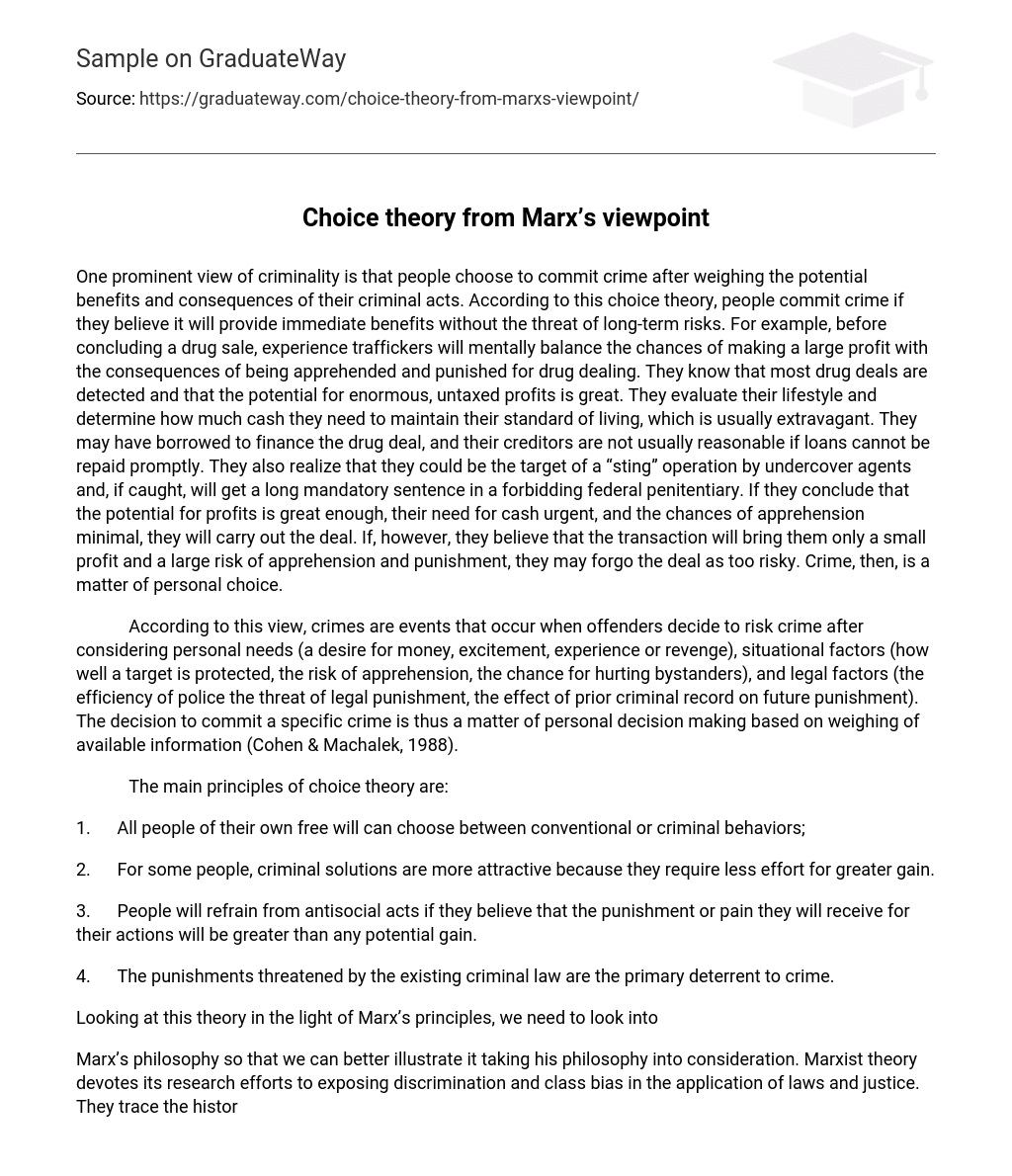One prominent view of criminality is that people choose to commit crime after weighing the potential benefits and consequences of their criminal acts. According to this choice theory, people commit crime if they believe it will provide immediate benefits without the threat of long-term risks. For example, before concluding a drug sale, experience traffickers will mentally balance the chances of making a large profit with the consequences of being apprehended and punished for drug dealing. They know that most drug deals are detected and that the potential for enormous, untaxed profits is great. They evaluate their lifestyle and determine how much cash they need to maintain their standard of living, which is usually extravagant. They may have borrowed to finance the drug deal, and their creditors are not usually reasonable if loans cannot be repaid promptly. They also realize that they could be the target of a “sting” operation by undercover agents and, if caught, will get a long mandatory sentence in a forbidding federal penitentiary. If they conclude that the potential for profits is great enough, their need for cash urgent, and the chances of apprehension minimal, they will carry out the deal. If, however, they believe that the transaction will bring them only a small profit and a large risk of apprehension and punishment, they may forgo the deal as too risky. Crime, then, is a matter of personal choice.
According to this view, crimes are events that occur when offenders decide to risk crime after considering personal needs (a desire for money, excitement, experience or revenge), situational factors (how well a target is protected, the risk of apprehension, the chance for hurting bystanders), and legal factors (the efficiency of police the threat of legal punishment, the effect of prior criminal record on future punishment). The decision to commit a specific crime is thus a matter of personal decision making based on weighing of available information (Cohen & Machalek, 1988).
The main principles of choice theory are:
1. All people of their own free will can choose between conventional or criminal behaviors;
2. For some people, criminal solutions are more attractive because they require less effort for greater gain.
3. People will refrain from antisocial acts if they believe that the punishment or pain they will receive for their actions will be greater than any potential gain.
4. The punishments threatened by the existing criminal law are the primary deterrent to crime.
Looking at this theory in the light of Marx’s principles, we need to look into
Marx’s philosophy so that we can better illustrate it taking his philosophy into consideration. Marxist theory devotes its research efforts to exposing discrimination and class bias in the application of laws and justice. They trace the history of criminal sanctions to show how those sanctions have corresponded to the needs of the wealthy. They attempt to show how police, courts and correctional agencies have served as tools of the powerful members of society. Marx believes that the governing ideology in a society is determined by the economic interests of the ruling class, the capitalists in the case of his own and contemporary society.
Marx reiterates the idea of material determinism: “the ruling ideas are nothing more than the ideal expression of the dominant material relationships” (176). True class consciousness requires that class members see the world from the perspective of their own true class interests and not from the point of view of the interests of the oppressor class. To absorb uncritically that class’s ideas is to operate in terms of “false consciousness.” Engaging in revolutionary praxis is one means Marx specifies by which consciousness of true class interests may be awakened. This is because in revolutionary activity, the changing of oneself coincides with the changing of circumstances. (Marx, 199).
In the choice theory, criminal solutions are more attractive because they require
less effort for greater gain and in looking at Marxists regard upon the idea of praxis, some will see the choice theory as an educational tool where groups will learn how to become aware of their oppressed conditions, thus, shedding “false consciousness” and moving toward changing their circumstances. The sense of alienation will not be there because there is a conscious choice on the best step to take. Alienation generally refers to the modern experience of being cut odd from oneself, from others, and from a sense of meaning. Marx determines that the root cause of alienation is the condition of alienated labor created by industrial capitalism.
At times Marx’s notion of praxis veers in the direction elaborated by later philosophers—that the human being constitutes the world, endows it with significance, humanizes it. In this way, the split between subjective and objective (and its inherent alienation) is healed or fused into an integrated process. Products no longer have significance as commodities, but rather have the qualitative personal meaning endowed by human consciousness. The choice theory finds that advantages weigh more than the disadvantages and that is what Marx indirectly alludes to as his philosophy maintains that the Marxist philosophy is a philosophy of revolutionary action because its nucleus is the conception world and himself.”
REFERENCES
Cohen, Lawrence and Machalek, Richard, “A General Theory of Expropriative Crime:
An Evolutionary Ecological Approach,” American Journal of Sociology 94 465-501.
Marx, “The German Ideology,” as cited in McLellan, Thought, p. 199.





